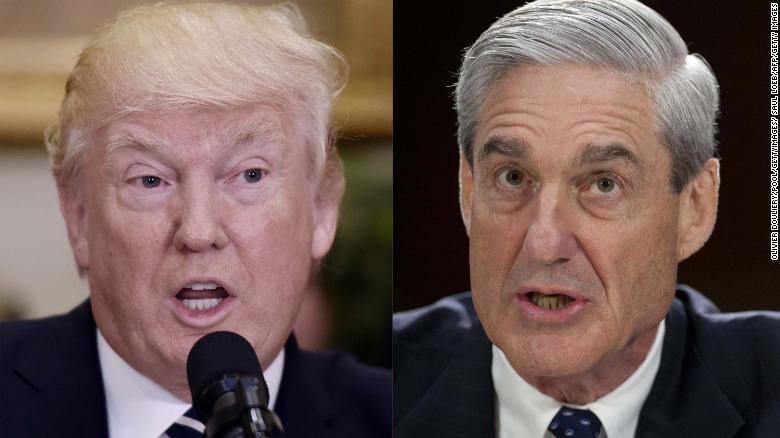Story highlights
- News emerged Tuesday that Comey and Sessions had spoken with the special counsel
- The Washington Post said Mueller was looking to interview Trump
Washington (CNN)Tuesday saw a flurry of new developments in the special counsel probe led by former FBI Director Robert Mueller, each adding to what the public knows about the investigation hanging over the Trump administration.
From a marquee interview that occurred last year to a potential presidential one in the works, here are five things that became public on Tuesday about the probe:
Mueller looking to talk to Trump
Sources told CNN on Tuesday that Mueller has indicated interest in questioning President Donald Trump about his dismissals of former FBI Director James Comey and former national security adviser Michael Flynn.
The sources cautioned against presuming the President would sit down with Mueller in the next few weeks, saying there is much to be negotiated still, and one source said the form of the interview -- including the extent to which Trump's answers would be written or in person -- is still in preliminary discussion.
The Washington Post previously reported Tuesday that Mueller is seeking to interview Trump.
Sources told the Post that Trump's legal team could soon try to present terms to the special counsel, seeking to have Trump's testimony come only in part through a face-to-face interview.
Flynn was ousted from the White House after reports said he misled Vice President Mike Pence about his conversations with the Russian ambassador at the time, Sergey Kislyak. The day after Flynn's exit from the White House, news emerged that Pence had learned he was misled just days prior while Trump was told about it more than two weeks beforehand.
Mueller examining for a "pattern" of Trump behavior
The Post report on a looming sit-down with the President cited one source who said Mueller had expressed interest in Trump's "efforts to remove" Attorney General Jeff Sessions. The source said Mueller is trying to find out if there is a "pattern" of behavior from the President.
Trump has voiced his displeasure with Sessions publicly for months. He said he would not have picked Sessions if he knew the Alabama Republican would recuse himself from the Russia probe, and in a year-end interview, Trump maintained he thought it was "too bad" Sessions had recused.
Concerns about Sessions' removal even led some Democrats who previously denounced the attorney general to say Sessions should stay on the job through the Mueller probe to maintain its independence.
Comey questioned last year, Sessions recently
After The New York Times reported Sessions faced special counsel investigators, Justice Department spokeswoman Sarah Isgur Flores confirmed on Tuesday the attorney general was questioned last week. A source told CNN that Sessions was not under subpoena, and that it was the first time Sessions was interviewed.
Trump told reporters on Tuesday afternoon that he is "not at all concerned" about what Sessions told the special counsel team.
Just as word was getting out about Sessions' testimony, news broke that Comey had spoken with special counsel investigators last year. Sources confirmed to CNN the interview had taken place, and The New York Times reported Comey was asked about memos he wrote on discussions he had with Trump.
After Comey's sudden firing last May, it became public that he had kept contemporaneous memos on conversations where he said Trump asked him to let go of an investigation into Flynn. Trump has denied Comey's account, but the dispute has been central to discussions about potential obstruction of justice.
Wray threatened to quit
A report from Axios Monday night said newly minted FBI Director Chris Wray threatened to resign after Sessions pressed him to fire FBI Deputy Director Andrew McCabe, another target of Trump's ire.
A source familiar with the conversation told CNN on Tuesday that Sessions had suggested to Wray that McCabe and James Baker, who was FBI general counsel at the time, should go and that Wray threatened to quit if McCabe lost his job.
On Tuesday, Trump denied Wray threatened to resign.
"He didn't at all," Trump said. "He did not even a little bit."
CNN previously reported that McCabe, who is eligible to retire in March, told other senior FBI officials months ago that he planned to retire in the near future, and The Washington Post reported late last year that Baker was reassigned.
Later Tuesday, the Post reported that Trump had asked McCabe who he voted for in the 2016 election.
Prosecutor who Trump once turned to now FBI-bound
Baker was reassigned from the position of FBI general counsel late last year, and on Tuesday, news came that his successor would be Dana Boente, a career prosecutor who announced plans last year to step down from his role as US attorney and acting head of the national security division of the Justice Department.
Boente is best known for the brief period when he was acting attorney general and launched into one of the earliest and most controversial moments of the Trump presidency.
Then-acting Attorney General Sally Yates refused to enforce a Trump order imposing a travel ban on several majority Muslim countries, leading Trump to fire her and name Boente the new interim Justice Department chief.
Boente remained the acting attorney general until Sessions' confirmation, and when Sessions announced his recusal from campaign related investigations, he named Boente the top Justice Department official overseeing what he had recused himself from, namely the Russia investigation.
Boente remained in that role until Rod Rosenstein was confirmed as deputy attorney general, and near the end of April 2017, CNN reported Boente would be acting head of the national security division, a high-profile position that oversaw the Russia investigation.




